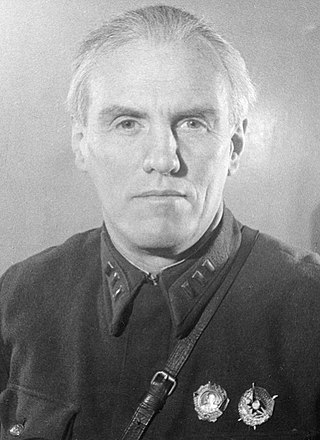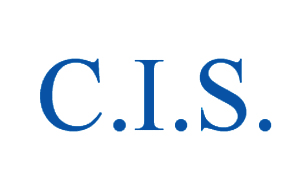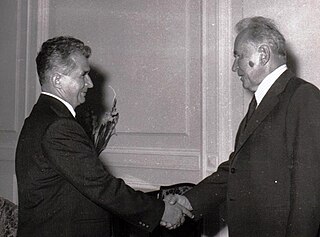Related Research Articles

Novodevichy Cemetery is a cemetery in Moscow. It lies next to the southern wall of the 16th-century Novodevichy Convent, which is the city's third most popular tourist site.
The Presidium of the Supreme Soviet of the Russian Soviet Federative Socialist Republic was the collective head of state of the Russian SFSR and the permanent body of the Supreme Soviet of the Russian SFSR that was accountable to the Supreme Soviet of the Russian SFSR in its activity and, within the nominal limits prescribed by the Constitution of the Russian SFSR, performed functions of the highest state power in the Russian SFSR between 1938 and 1990. It was elected by the Supreme Soviet of the Russian Soviet Federative Socialist Republic to perform the Supreme Soviet's activities when it was not in session, which, in practice, was most of the year.

Alexei Nikolayevich Kosygin was a Soviet statesman during the Cold War. He served as the Premier of the Soviet Union from 1964 to 1980 and was one of the most influential Soviet policymakers in the mid-1960s along with General Secretary Leonid Brezhnev.
Nikolai Aleksandrovich Tikhonov was a Soviet Russian-Ukrainian statesman during the Cold War. He served as Chairman of the Council of Ministers from 1980 to 1985, and as a First Deputy Chairman of the Council of Ministers, literally First Vice Premier, from 1976 to 1980. Tikhonov was responsible for the cultural and economic administration of the Soviet Union during the late era of stagnation. He was replaced as Chairman of the Council of Ministers in 1985 by Nikolai Ryzhkov. In the same year, he lost his seat in the Politburo; however, he retained his seat in the Central Committee until 1989.

Nikolai Ivanovich Ryzhkov was a Russian politician. He served as the last chairman of the Council of Ministers of the Soviet Union from 1985 to 1991 and was succeeded by Valentin Pavlov as prime minister. The same year, he lost his seat on the Presidential Council, going on to become Boris Yeltsin's leading opponent in the 1991 presidential election of the Russian Soviet Federative Socialist Republic. He was the last surviving premier of the Soviet Union following the death of Ivan Silayev on 8 February 2023.
Tikhonov, sometimes spelled as Tychonoff, or Tikhonova is a Russian surname that is derived from the male given name Tikhon, the Russian form of the Greek name Τύχων, and literally means Tikhon's. It may refer to:

Ivan Stepanovich Silayev was a Soviet and Russian politician. He served as Prime Minister of the Soviet Union through the offices of chairman of the Committee on the Operational Management of the Soviet economy and chairman of the Inter-republican Economic Committee. Responsible for overseeing the economy of the Soviet Union during the late Gorbachev era, he was the last head of government of the Soviet Union, succeeding Valentin Pavlov.
The men's ice hockey tournament at the 1992 Winter Olympics in Albertville, France, was the 17th Olympic Championship. The games were played at the Méribel Ice Palace in Méribel, about 45 km from host city Albertville. The competition, held from 9 to 23 February, was won by the Unified Team in its only appearance. The team was composed of some newly emerged nations from the former Soviet Union, which had dissolved just weeks before the Games began. Canada won the silver medal, its first hockey medal since 1968 and 11th Olympic ice hockey medal.

Nikolai Semenovich Tikhonov was a Soviet writer, poet and public figure.
The Union of Soviet Writers, USSR Union of Writers, or Soviet Union of Writers was a creative union of professional writers in the Soviet Union. It was founded in 1934 on the initiative of the Central Committee of the Communist Party (1932) after disbanding a number of other writers' organizations, including Proletkult and the Russian Association of Proletarian Writers.
The Food Programme was an initiative to enhance and improve the conditions of Soviet agriculture by improving the planning mechanism during the Eleventh Five-Year Plan (1981–1985) and Twelfth Five-Year Plan (1986–1990).
Soyuz was a faction in the Congress of People's Deputies of the USSR. The faction was critical of Perestroika and liberal reforms; it was opposed to de-centralization of the Soviet Union. The group was founded on 14 February 1990, and its leaders included Viktor Alksnis, Yegor Ligachev, Nikolai Petrushenko, Yevgeny Kogan, and Anatoly Checkoyev. The faction claimed to have 500 members in the USSR Supreme Soviet.

Nikolai Matveyevich Velikov is a Russian pair skating coach.
The government of the Soviet Union under Alexei Kosygin was dissolved following Kosygin's resignation in October 1980, with Nikolai Tikhonov taking over the office of Premier. This government was dissolved following the nationwide 1984 legislative election.

The CIS national ice hockey team was an ephemeral national ice hockey team that represented the Commonwealth of Independent States. Essentially the former Soviet team under a different name, the CIS team existed in the few months between the dissolution of the Soviet Union and the formation of new ice hockey federations for the former Soviet states, now independent countries. Most notably, the team competed at the 1992 Winter Olympics as part of the Unified Team, winning the gold medal. However, the International Ice Hockey Federation would later attribute this gold medal to Russia as the successor state. The International Olympic Committee does not attribute that medal to Russia. After the Olympics, the CIS team ceased to exist and was replaced by the Russian team. In the 13 games the CIS played, they won 11 and lost 2.

The 1979 Soviet economic reform, or "Improving planning and reinforcing the effects of the economic mechanism on raising the effectiveness in production and improving the quality of work", was an economic reform initiated by Alexei Kosygin, the Chairman of the Council of Ministers. During Leonid Brezhnev's rule of the Union of Soviet Socialist Republics (USSR) the Soviet economy began to stagnate; this period is referred to by historians as the Era of Stagnation. Even after several reform attempts by Kosygin and his protégés, the economic situation in the country continued to deteriorate. In contrast to his earlier reform initiative, the 26th Congress decided that his government would implement the reform during the Eleventh five-year plan from 1981 to 1985. This never happened, and even Brezhnev complained that implementation of the reform had been slow. This unfinished reform is seen by some as the last major pre-perestroika reform initiative put forward by the Soviet government.
The Eleventh Five-Year Plan, or the 11th Five-Year Plan, of the Union of Soviet Socialist Republics (USSR) was a set of goals designed to strengthen the country's economy between 1981 and 1985. The plan was presented by the Chairman of the Council of Ministers Nikolai Tikhonov at the 26th Congress of the Communist Party of the Soviet Union (CPSU).

The Premier of the Soviet Union was the head of government of the Union of Soviet Socialist Republics (USSR). From 1923 to 1946, the name of the office was Chairman of the Council of People's Commissars, and from 1946 to 1991 its name was Chairman of the Council of Ministers. During the dissolution of the Soviet Union in 1991, its name was briefly Prime Minister and later Chairman of the Committee on the Operational Management of the Soviet Economy. The first Soviet premier was the country's founder and first leader, Vladimir Lenin. After 1924, when General Secretary of the Communist Party Joseph Stalin rose to power, the de facto leader was the party's General Secretary, with Stalin and his successor Nikita Khrushchev also serving as premier. Twelve individuals held the post.
The following lists events that happened during 1980 in the Union of Soviet Socialist Republics.
References
- General
- Government of the Soviet Union > List
- "Governments of the Union of Soviet Socialist Republics (1964–1991)". elisa.net. Archived from the original on July 16, 2011. Retrieved September 12, 2010.
- Specific